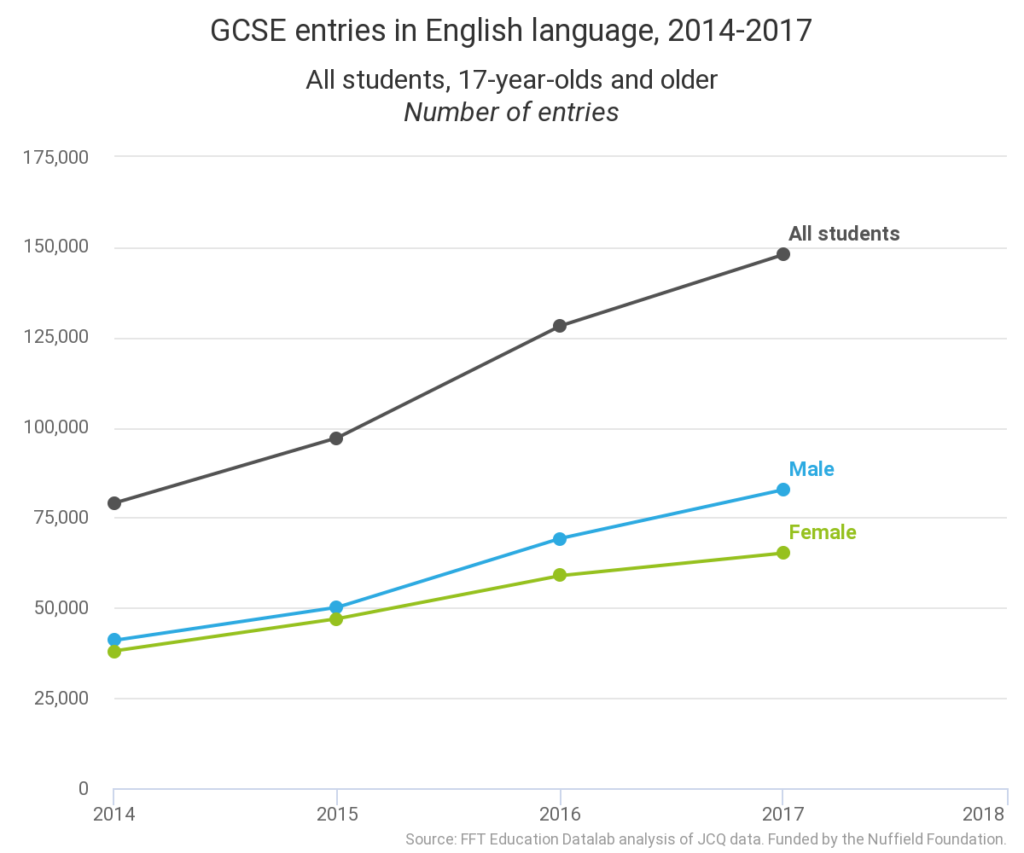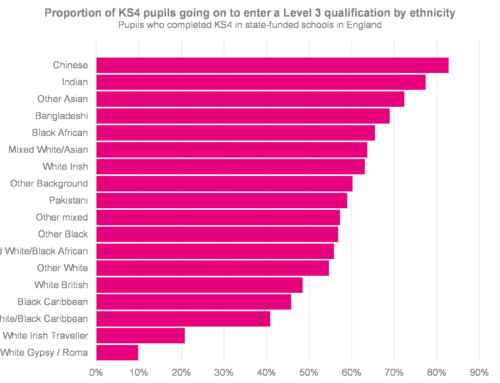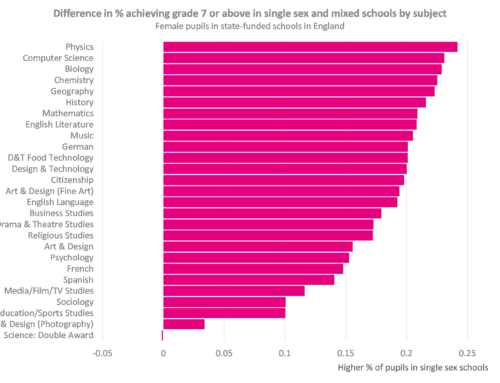This blogpost forms part of a package of A-Level and GCSE results analysis, with funding received from the Nuffield Foundation. View our results day microsite, which shows national trends in entries and attainment for each GCSE subject. Data for 2018 will be available at 9.30am on 23 August.
1. Another batch of subjects have been reformed in England and Wales
Last year, English and maths were the only GCSEs that featured in results for England that had been reformed – with the familiar A*-G grading system replaced by 9-1 grades.
This year there will be results for a further 20 newly-reformed subjects, including almost all of the large-entry subjects.
And, while the reformed GCSEs are designed to be more demanding, with less coursework, we’re unlikely to see big changes in grade distributions.
Under Ofqual’s comparable outcomes policy, England’s exam regulator largely uses the prior attainment of this year’s cohort of 16-year-olds from the end of primary school to determine how the mix of grades awarded in a subject should differ from last year – so if this year’s GCSE cohort had similar prior attainment to last year’s, a broadly similar mix of grades is likely to be awarded.
In Wales, new GCSEs were awarded in English, maths and Welsh last summer[1], and a second batch of GCSEs have now been reformed, though A*-G grades have been retained.
In Northern Ireland, reformed (A*-G) GCSEs will only be awarded for the first time in 2019. Comparable outcomes policies also apply in Wales and Northern Ireland, again meaning consistency is likely to be the order of the day when it comes to the mix of grades awarded.
2. Post-16 entries will still contribute large numbers in English language and maths
In England, since 2015, pupils who achieved a grade D (pre-2017)/grade 3 (2017 onwards) in maths who have continued on in further study have been required to resit maths GCSE.
The same has been true for English language, albeit that if the pupil achieved higher than a grade D/3 in English literature they would not have to resit English language.
This has led to a massive increase in the number of 17-year-olds taking these qualifications.
In the case of maths, these numbers might have reduced a little this year (we touched on a reason why in this post last year), but there’s little doubt that post-16 entries will remain at significant levels in both English language and maths.
Explore trends in entry numbers and grades by age for English language and maths.
3. Science GCSEs have changed and entry patterns are likely to have changed as a result
While all GCSE subjects are being reformed, you could make a reasonable argument that science subjects are being reformed more than most.
Previously in England and Wales, pupils have either:
- taken the single sciences – biology, chemistry and physics; or
- taken GCSE science, generally with additional science as a second science GCSE, and less commonly also with further additional science.
This year, in England and Wales, the former science, additional science and further additional science GCSEs are no more. Pupils now either take the single sciences, or they take a new double award science GCSE.[2]
Interestingly, analysis that England’s exam regulator, Ofqual, published at the start of the summer suggested that the change to science subjects might have prompted some schools in England to review their entry decisions. Their preliminary data suggests there might have been a bigger increase in single science entries in England this year than the total number of entries in further additional science last year would have implied.
The Northern Irish exam board offers single award science and double award science as well as the three single sciences, and single award science will remain an option there, even after reformed science GCSEs come in next summer.
Explore trends in entry numbers and grades between 2014 and 2017 for biology, chemistry, physics, science, additional science and further additional science.
4. There might have been an increase in entries in EBacc subjects – but it’s worth stopping to ask more questions
Based on the data that Ofqual released at the start of the summer, in England it looks like entries in most subjects that count in the English Baccalaureate (EBacc) – one of the government’s headline school performance measures, that measures performance in a basket of academic subjects will be up a little bit, with entries in many non-EBacc subjects down.[3]
It’s worth noting that some, though not all, of that increase will be due to the science reform mentioned above – with some pupils switching from two science subjects to three.
So, if we want an idea if more pupils are taking the EBacc, it might be better just to focus on what’s going on with languages, which is the main barrier to the government’s ambitions of more pupils taking the EBacc. And there it looks like there might be a little bit of positive news – again, based on Ofqual’s preliminary figures, it appears that modern foreign language entry numbers in England might be up slightly, or at least stable, halting the decline of recent years.
(Similar preliminary figures [PDF] suggest language entries were down in Wales this summer, with figures not yet available for Northern Ireland.)
Explore trends in entry numbers and grades between 2014 and 2017 for French, German, Spanish and other modern languages.
And finally
We’ll be taking a look at all of these points and more on Thursday. Data for 2014-2017 is already available on our results microsite, so do familiarise yourself with the site ahead of Thursday – and if you spot anything that you think deserves our attention, leave a comment below.
This blogpost forms part of a package of A-Level and GCSE results analysis, with funding received from the Nuffield Foundation. View our results day microsite, which shows national trends in entries and attainment for each GCSE subject. Data for 2018 will be available at 9.30am on 23 August.
1. These were GCSEs in English language; English literature, Welsh language; Welsh literature; maths; and maths: numeracy. A new GCSE in second language Welsh will be awarded for the first time in 2019.
2. In England, pupils taking double award science can achieve any combination of repeated or adjacent numbers – 9-9, 7-6, 4-4, for example, but not 5-3. Confusingly, in Wales, where grades are still letters, any combination is possible – so, A*-B is possible, for example.
3. The five pillars of the EBacc are as follows:
- English language and English literature (with results from the better of the two counted)
- maths;
- sciences: double-award science or three single sciences (in which computer science also counts as a single science, with the results of the best two are counted)
- history or geography;
- a language







Dear Philip,
This is a very interesting blogpost.
I have one question regarding the expected increase in entries in E-Bacc subjects.
Would you consider the introduction of the E-Bacc APS, which is the new E-Bacc headline measure, as a major factor of the increase (if it happens) in entries in the E-Bacc subjects?
Kind regards,
Leonidas
Hello Leonidas, thanks for your comment.
We think that a move to EBacc APS may have some effect on EBacc entries – but that’s something that would only really have an impact from next summer rather than this summer. EBacc APS was only announced by the government in July 2017, so this summer’s GCSE students would already have been halfway through their courses when we first learnt about it.
Best,
Philip
It’s interesting – my gut feeling would be that, if anything, the move to APS could depress the number of students taking languages or humanities. Under the old Pass/Fail regime, there was a strong incentive for schools to push as many pupils as possible to take all pillars of the EBacc, because if they missed any one subject area out then they would count for nothing on the EBacc tables. But in the new APS world, kids can still make a positive contribution to their school’s results even if they are missing a foreign language. On the other hand, if they had no chance of getting the magic C-grade before then there was no point in pushing them to take that subject, whereas now even if they only get a 3 or 4, that will still boost the school’s numbers more than a zero.
It could go either way!
Of course, in an ideal world, schools wouldn’t be gaming the system by looking at the likely impact on their league table ranking when looking at curriculum choices and GCSE options :-/